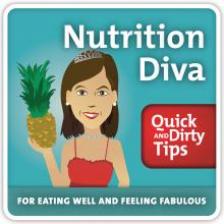When Doctors Drop the Ball
If a medical condition is largely driven or mitigated by diet and nutrition, why don’t doctors refer patients to nutritionists for help? Here’s what happens when doctors drop the ball.

But when it comes to nutrition, they sometimes drop the ball. To be fair, nutrition is typically a very small part of their medical training. That’s why health professionals work as a team! Most nutritionists are quick to refer patients to doctors for help with problems that are outside our domain. Why, then, are doctors so slow to refer patients to nutritionists for help with conditions that are largely driven or mitigated by diet and nutrition?
A letter I received this week is a perfect example.
Sponsor: Want to save more, invest for the future, but don’t have time to be a full-on investor? Betterment.com helps you build a customized, low-cost portfolio that suits your goals. Sign up at betterment.com/nutritiondiva and receive a $25 bonus when you make a deposit of $250 or more.
Felicity saw a gastroenterologist for evaluation of some long-standing digestive issues. After doing an endoscopy and colonoscopy, the doctor told Felicity that she suffered from excess stomach acid, IBS, and diverticulosis. He then got out his pad and wrote her prescriptions for an acid blocker and an antispasmodic, told her to eat more fiber and to come back in 6 weeks.
Really?
Felicity has been diagnosed with three different conditions for which dietary interventions can be highly effective — not to mention safer and less costly than drugs. However, coordinating a dietary response to these three issues presents some challenges. A high-fiber diet, for example, may help with diverticulosis but make IBS worse!
This doctor may not have had the time — or the expertise — to tackle this essential part of Felicity’s treatment plan. But you would hope that a doctor who specializes in digestive diseases would be tuned into the crucial role of diet and nutrition on patient health. Instead of just throwing drugs at the problem, I wish he’d used that prescription pad to write Felicity a referral to a dietitian or nutritionist.
What is Diverticulosis?
Diverticulosis is not really a disease; it’s a fairly common condition where small pockets or pouches form in the lining of the large intestine. Many people have diverticulosis without experiencing any symptoms. The danger is that material can become trapped in these pockets, causing inflammation or infection. This is called diverticulitis and is usually treated with antibiotics. If you know you have diverticulosis, you can take steps to prevent the more dangerous diverticulitis.

Adding fiber to your diet, however, can help reduce the risk of diverticular disease. In particular, you want insoluble fiber, which is the kind of fiber found in wheat and oat bran.
See also: What Is the Difference Between Soluble and Insoluble Fiber?
But here’s where things might get a little complicated for Felicity…..
How Does Fiber Affect IBS?

The Problem with Acid-Blockers
And, finally, there’s the issue of Felicity having “too much stomach acid.” As I explained in my episode on Gastro-esophageal Reflux Disease (GERD), the problem with reflux is isn’t having too much stomach acid but having stomach acid in the wrong place — that is, outside the stomach. Although acid-blocking medications can help with symptoms, they don’t address the actual problem. (In fact, they may make it worse.) Suppressing stomach acid can also impair your ability to digest food before it leaves the stomach, which can exacerbate IBS symptoms. Long-term reliance on acid-blocking meds also increases your risk of food borne infection and weakened bones.
See also: 5 Tips to Prevent Acid Reflux
If ever there were a time to call in a nutrition professional, this would be it. Unfortunately, Felicity’s doctor dropped the ball.
What to Do If Your Doctor Drops the Ball
Obviously, a situation of this complexity calls for more than the “quick and dirty tips” that I offer in this podcast. For Felicity and anyone else that might be in a similar situation, I strongly urge you to seek support from a qualified nutrition professional, who can work with your medical doctor to customize a dietary prescription based on your individual concerns — and then work with you to translate that prescription into foods and meals that you can enjoy, and to adjust your program as needed.
See also: Reliable Sources of Nutritional Information
Finally, although I think they are often overused, I don’t mean to suggest that drugs have no legitimate role in the treatment of digestive disease. Prescription medications may well be an important part of your treatment plan. But take the time to read all the information that accompanies your prescriptions or to research them online. If you have any concerns or questions about what a drugs is for or how you’re supposed to take it, don’t be shy about calling your doctor back for clarification. If your doctor doesn’t have the time or staff to address your questions and concerns, it’s time to find a new doctor!
 Keep in Touch
Keep in Touch
Post your comments, questions, and or topic suggestions below, or join the conversation on the Nutrition Diva Facebook page. I always love to hear from you! And don’t forget to subscribe to my free weekly newsletter for more nutrition tips, recipes, and answers to your questions.
Have a great week and eat something good for me!
Doctor and patient, doctor with pills, and stomach acid images courtesy of Shutterstock.


 Keep in Touch
Keep in Touch



